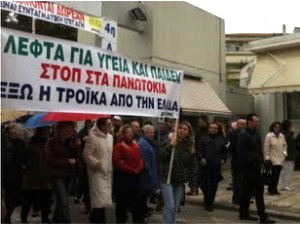By Michael MacGregor

‘It’s either them or us! … We ask for the solidarity of the people and workers from all fields, the collaboration of all workers’ unions and progressive organisations … universal labour and popular resistance and uprising, until our final victory against the economic and political elite that today oppresses our country and the whole world.’ (Appeal from Kilkis General Hospital workers, northern Greece)
The statement of workers who have taken control of Kilkis General Hospital in Greece since 5 February directly addresses the Greek working class and the Greek people. The sovereign debt crisis which followed the 2008 crisis is devastating Greek society. Now the troika of the European Community, the European Central Bank and the International Monetary Fund direct the operation to bleed a country dry. Since 2008:
- Wages and salaries in the private sector have decreased by 20% and in the public sector by up to 50%;
- Over one million Greeks, one in five adults and one in two young people, are unemployed;
- Only a third of these receive unemployment benefits, which are now due to be reduced.
The austerity package agreed on 12 February by the Greek parliament in Athens, was greeted with outrage by the 100,000 people who demonstrated in front of the building. The package requires spending cuts of around €3.3bn in return for a further instalment of a bailout of €130bn to prop up the Greek financial system. The Greek parliament also capitulated to a troika demand of a further tranche of cuts of €350 million. Wages, pensions, jobs, social security and health budgets, all are to be cut further with more to come. The measures include:
- 150,000 redundancies in the public sector by 2015, with 15,000 to go this year
- Pension cuts totalling €300 million this year, with all pensions being reduced by 15% this year;
- Health spending to be axed by €1.1bn, 12.5% of the annual budget;
- Federal minimum wage for 300,000 workers to be cut by 22%, with that for those under the age of 25 to be cut by 32%: this will affect 25% of the workforce;
Greece must pay €14.4bn to private bankers by 20 March otherwise it will be declared to have defaulted on its loans. Such a step could threaten the financial stability of the eurozone and even the City of London. This has led to divisions amongst the major European imperialist powers over the desirability and effect of a Greek exit from the Euro (see David Yaffe ‘Imperialists manoeuvre as eurocrisis deepens‘, FRFI 225). On 21 February the Greek parliament agreed a bond swap which would cut its privately-held debt by 107bn; it requires private bondholders to exchange their devalued Greek government bonds with new ones with a 53.5% lower face value, longer maturities and lower interest rates. The Geek economy is expected to contract by 4.4% this year, the fifth consecutive year of recession; credit rating agency Fitch reduced Greece’s rating to C, one step above default.
In defending the cuts, Prime Minister Lucas Papademos declared that a default ‘would create conditions of uncontrolled economic chaos and a social explosion. The state would be unable to pay wages and pensions and cover basic operational costs such as those of hospitals and schools…The living standards of Greeks would collapse and the country would be dragged into a spiral of recession, instability, unemployment and misery.’
Yet this is precisely what the Greek people are facing even before any default. ‘We are only allowed to choose between different forms of death’ declared one 50-year-old protester. Homelessness – virtually unknown previously in Athens – has risen to 20,000 in the city. The poor sift waste for sustenance as churches feed 250,000 mouths a day. Families break up as children are left in nurseries to be fed and old folks are brought back from care homes by relatives unable to pay fees. The working class is being forced to pay over and over again, while the Greek ruling class can keep its deposits of €560bn in foreign accounts, equivalent to twice the national debt.
For four years working class people in Greece, in and outside the trade union movement, have fought back against their impoverishment. The forms of that resistance have been many and varied: millions have participated in 15 general strikes in the last two years. Alongside this there have been countless militant street protests and demonstrations, workplace occupations, and daily workplace assemblies. Government workers have refused to collect increased taxes, and staff from 15 hospitals held a general assembly as part of an occupation of the Ministry of Health. Workers facing redundancies in factories are calling for all-out strikes, ‘a people’s default’ on the loans has been declared. The occupations of city squares, such as Syntagma Square in Athens, drew tens of thousands of young people, unemployed graduates and proletarianised professionals suddenly facing poverty. This movement rejects corrupt parliamentary politics and will not limit itself to respectable forms of protest that have been associated with the leadership of the official trade union movement. As the Kilkis workers have declared: it is either them or us!




